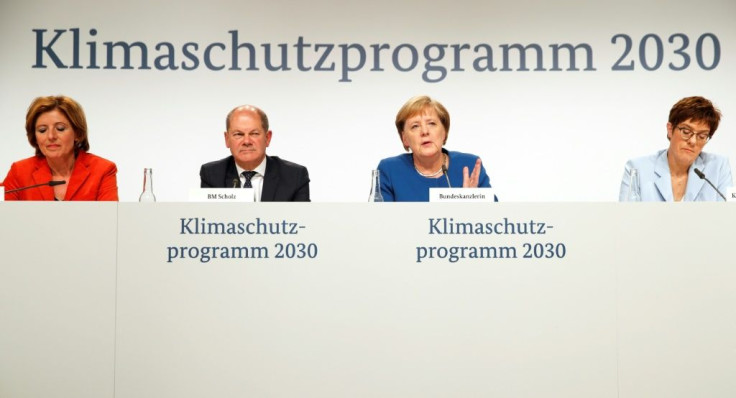German Politics In Disarray As Angela Merkel’s Handpicked Successor Quits Party Leadership

KEY POINTS
- Right-wing members of CDU welcomed Kramp-Karrenbauer's resignation
- Kramp-Karrenbauer's authority was weakened by the recent election fiasco in Thuringia
- Kramp-Karrenbauer will stay on as defense minister
Germany’s ruling Christian Democratic Union, or CDU, party has been thrown into a crisis after Chancellor Angela Merkel’s apparent successor said she will quit as head of CDU.
Annegret Kramp-Karrenbauer, 57, also said she will not run for the chancellorship at the next federal election.
Kramp-Karrenbauer had taken over as chief of the CDU in December 2018 following her nomination by Merkel.
The development further complicated Merkel’s succession plans after some delegates of the center-conservative CDU began cooperating with the far-right Alternative fur Deutschland, or AfD, party in defiance of Merkel’s orders.
CDU members in the eastern state of Thuringia had voted with the AfD to remove the state’s premier Bodo Ramelow of the leftist Die Linke party.
Outraged by CDU members’ alignment with a far-right party, Merkel intervened by firing two local CDU officials.
In addition, Thomas Kemmerich of the Free Democratic Party, the Thuringian politician who won the local election with help from both CDU and AfD, suddenly stepped down under pressure and "to remove the stain of the AfD's support for the office of the premiership.”
AfD has been widely condemned for its extremist positions on immigration and freedom of speech.
This unexpected fiasco appeared to have influenced Kramp-Karrenbauer’s decision to quit her CDU leadership post. Her authority was further undermined when CDU officials in Thuringia initially rejected her demands to dissolve the state parliament and call a new election.
She had also failed to develop her own personality and power base within the party even after she became defense minister last July.
In her resignation, Kramp-Karrenbauer, widely known as “AKK,” noted that she opposed CDU forming alliances with either extreme right-wing or extreme left-wing parties.
Olav Gutting, a CDU politician who has questioned Merkel’s moderate policies, welcomed AKK’s departure.
“Regardless of personal sympathy, one has to see that the [CDU] base had growing doubts about AKK’s capabilities for the chancellorship,” Gutting said. “Her mistakes just kept piling up. People like her a lot as a person, but the grass roots had growing doubts about her fitness for the highest office.”
Hans-Georg Maassen, another CDU conservative and former chief of German domestic intelligence, also welcomed AKK’s departure. “The CDU needs a leader who solves problems and is not herself part of the problem,” he said.
Her replacement as CDU boss is expected to be chosen in the summer. Merkel reportedly approved of a request by AKK to remain as German defense minister.
AKK initially joined CDU in 1981 as a 19-year-old student. By 2000, she became the first woman to become a state minister for internal affairs. By 2011 she was the first woman to serve as prime minister of Saarland, a small state in southwestern Germany. She held that position until 2018 when Merkel nominated her as CDU general secretary.
“The erosion of AKK’s power was unmistakable,” said Thorsten Faas, a political scientist at Free University in Berlin. “The conservative circles in the [CDU and affiliated parties] challenged her, and AKK could not calm them down.”
Another CDU MP asserted: “She clearly realized that there was no easy way out of the hole she had fallen into. She had made so many mistakes, and she just could not turn things around.”
AKK’s resignation raises questions over who will now succeed Merkel when national elections are held – most likely in 2021.
Possible contenders for CDU leadership are deputy chairman Armin Laschet, Health Minister Jens Spahn; former businessman and Merkel rival Friedrich Merz; and Markus Soeder, the leader of the Christian Social Union, or CSU, an affiliate of the CDU in Bavaria.
Merkel reportedly did not want the next CDU leader to come from the party’s right-wing branches nor did she want anyone who would ignore environmental and social issues.
CDU also must contend with the rise of AfD in eastern Germany, a part of the country that has not shared in its economic prosperity and which resents the influx of refugees from the Middle East and elsewhere.
The Financial Times reported that if either Merz or Spahn, both conservatives, become party boss, it “would mark a watershed for the CDU, which has moved to the center ground of German politics” under Merkel.
© Copyright IBTimes 2024. All rights reserved.





















